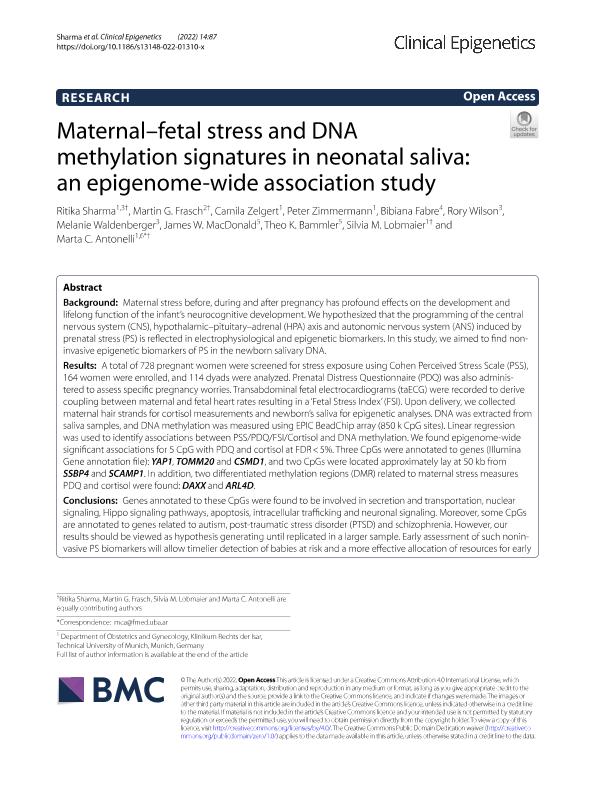Mostrar el registro sencillo del ítem
dc.contributor.author
Sharma, Ritika
dc.contributor.author
Frasch, Martin Gerbert

dc.contributor.author
Zelgert, Camila
dc.contributor.author
Zimmermann, Peter
dc.contributor.author
Fabre, Bibiana

dc.contributor.author
Wilson, Rory
dc.contributor.author
Waldenberger, Melanie
dc.contributor.author
MacDonald, James W.
dc.contributor.author
Bammler, Theo K.
dc.contributor.author
Lobmaier, Silvia M.
dc.contributor.author
Antonelli, Marta Cristina

dc.date.available
2023-10-05T14:52:16Z
dc.date.issued
2022-12
dc.identifier.citation
Sharma, Ritika; Frasch, Martin Gerbert; Zelgert, Camila; Zimmermann, Peter; Fabre, Bibiana; et al.; Maternal–fetal stress and DNA methylation signatures in neonatal saliva: an epigenome-wide association study; BioMed Central; Clinical Epigenetics; 14; 1; 12-2022; 1-18
dc.identifier.issn
1868-7075
dc.identifier.uri
http://hdl.handle.net/11336/214245
dc.description.abstract
Background: Maternal stress before, during and after pregnancy has profound effects on the development and lifelong function of the infant’s neurocognitive development. We hypothesized that the programming of the central nervous system (CNS), hypothalamic–pituitary–adrenal (HPA) axis and autonomic nervous system (ANS) induced by prenatal stress (PS) is reflected in electrophysiological and epigenetic biomarkers. In this study, we aimed to find noninvasive epigenetic biomarkers of PS in the newborn salivary DNA. Results: A total of 728 pregnant women were screened for stress exposure using Cohen Perceived Stress Scale (PSS), 164 women were enrolled, and 114 dyads were analyzed. Prenatal Distress Questionnaire (PDQ) was also administered to assess specific pregnancy worries. Transabdominal fetal electrocardiograms (taECG) were recorded to derive coupling between maternal and fetal heart rates resulting in a ‘Fetal Stress Index’ (FSI). Upon delivery, we collected maternal hair strands for cortisol measurements and newborn’s saliva for epigenetic analyses. DNA was extracted from saliva samples, and DNA methylation was measured using EPIC BeadChip array (850 k CpG sites). Linear regression was used to identify associations between PSS/PDQ/FSI/Cortisol and DNA methylation. We found epigenome-wide significant associations for 5 CpG with PDQ and cortisol at FDR < 5%. Three CpGs were annotated to genes (Illumina Gene annotation file): YAP1, TOMM20 and CSMD1, and two CpGs were located approximately lay at 50 kb from SSBP4 and SCAMP1. In addition, two differentiated methylation regions (DMR) related to maternal stress measures PDQ and cortisol were found: DAXX and ARL4D. Conclusions: Genes annotated to these CpGs were found to be involved in secretion and transportation, nuclear signaling, Hippo signaling pathways, apoptosis, intracellular trafficking and neuronal signaling. Moreover, some CpGs are annotated to genes related to autism, post-traumatic stress disorder (PTSD) and schizophrenia. However, our results should be viewed as hypothesis generating until replicated in a larger sample. Early assessment of such noninvasive PS biomarkers will allow timelier detection of babies at risk and a more effective allocation of resources for early intervention programs to improve child development. A biomarker-guided early intervention strategy is the first step in the prevention of future health problems, reducing their personal and societal impact.
dc.format
application/pdf
dc.language.iso
eng
dc.publisher
BioMed Central

dc.rights
info:eu-repo/semantics/openAccess
dc.rights.uri
https://creativecommons.org/licenses/by/2.5/ar/
dc.subject
BIOMARKERS
dc.subject
CORTISOL
dc.subject
DNA METHYLATION
dc.subject
EPIGENETICS
dc.subject
EWAS
dc.subject
NEWBORN SALIVA
dc.subject
PERCEIVED STRESS
dc.subject
PREGNANCY
dc.subject
PRENATAL STRESS
dc.subject.classification
Obstetricia y Ginecología

dc.subject.classification
Medicina Clínica

dc.subject.classification
CIENCIAS MÉDICAS Y DE LA SALUD

dc.title
Maternal–fetal stress and DNA methylation signatures in neonatal saliva: an epigenome-wide association study
dc.type
info:eu-repo/semantics/article
dc.type
info:ar-repo/semantics/artículo
dc.type
info:eu-repo/semantics/publishedVersion
dc.date.updated
2023-07-13T12:01:24Z
dc.identifier.eissn
1868-7083
dc.journal.volume
14
dc.journal.number
1
dc.journal.pagination
1-18
dc.journal.pais
Estados Unidos

dc.description.fil
Fil: Sharma, Ritika. Technische Universitat München; Alemania
dc.description.fil
Fil: Frasch, Martin Gerbert. University of Washington; Estados Unidos
dc.description.fil
Fil: Zelgert, Camila. Technische Universitat München; Alemania
dc.description.fil
Fil: Zimmermann, Peter. Technische Universitat München; Alemania
dc.description.fil
Fil: Fabre, Bibiana. Universidad de Buenos Aires. Facultad de Farmacia y Bioquímica. Instituto de Fisiopatología y Bioquímica Clínica; Argentina
dc.description.fil
Fil: Wilson, Rory. Helmholtz Zentrum Munich; Alemania
dc.description.fil
Fil: Waldenberger, Melanie. Helmholtz Zentrum Munich; Alemania
dc.description.fil
Fil: MacDonald, James W.. University of Washington; Estados Unidos
dc.description.fil
Fil: Bammler, Theo K.. University of Washington; Estados Unidos
dc.description.fil
Fil: Lobmaier, Silvia M.. Technische Universitat München; Alemania
dc.description.fil
Fil: Antonelli, Marta Cristina. Consejo Nacional de Investigaciones Científicas y Técnicas. Oficina de Coordinación Administrativa Houssay. Instituto de Biología Celular y Neurociencia "Prof. Eduardo de Robertis". Universidad de Buenos Aires. Facultad de Medicina. Instituto de Biología Celular y Neurociencia; Argentina
dc.journal.title
Clinical Epigenetics
dc.relation.alternativeid
info:eu-repo/semantics/altIdentifier/url/https://doi.org/10.1186/s13148-022-01310-x
dc.relation.alternativeid
info:eu-repo/semantics/altIdentifier/doi/http://dx.doi.org/10.1186/s13148-022-01310-x
Archivos asociados
